Lady Seeks To Know If She's AH For Not Letting Bridesmaid Bring Her ESA To Bachelorette Party
For people with certain needs, support animals can offer social support, emotional comfort, and other helpful behaviors. Plans for mental health treatment can greatly benefit from the inclusion of emotional support animals, and properly trained animals can truly change the lives of their owners.
A doctor's prescription designates a pet as an emotional support animal, which is then used in conjunction with the owner's mental health treatment plan. Any kind or age of animal may be acceptable as long as it can be controlled in public areas.
Speaking of public areas, a particular bridesmaid wanted to bring her emotional support dog on a trip. This wouldn't be a problem, but she wasn't willing to pay for it.
The thing is, the narrator of today's story is the maid of honor for her sister's wedding. They're planning a bachelorette weekend in Vegas since OP's sister has never been there before.
One of the bridesmaids asked in the group chat about accommodations for her dog, a fifty-pound Australian shepherd. The OP was taken aback because this same bridesmaid literally flew to Istanbul not long ago without this dog, and there was no issue whatsoever.
The hotel we're booking does have dog-friendly rooms, but it doesn't allow pets to roam freely around the hotel room unsupervised. Additionally, the OP's sister is allergic to dogs, but the OP gave this bridesmaid an option.
Find out what happens next as you read the full story below.
The OP writes

They all plan to be out of the hotel as much as possible
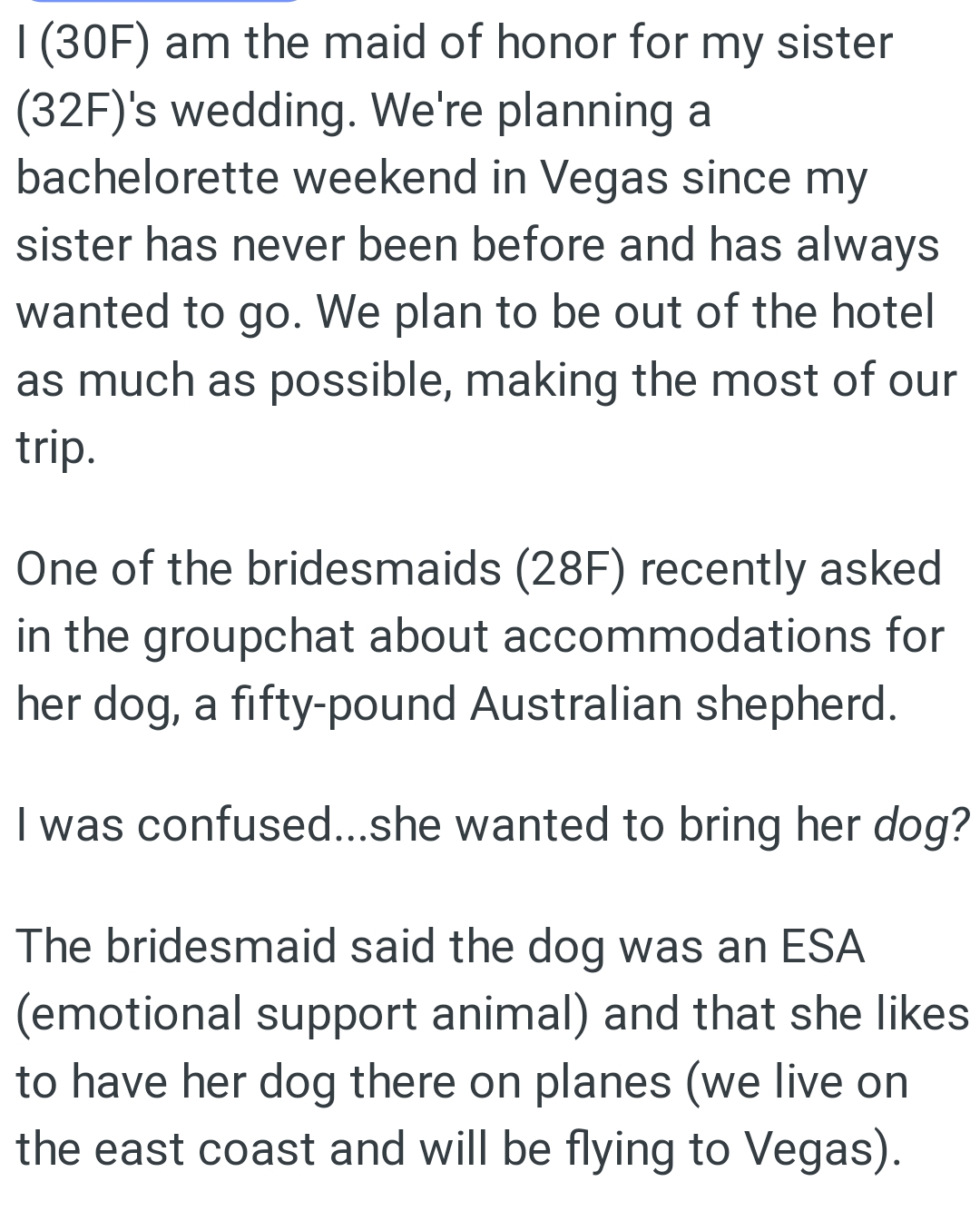
Understanding Emotional Support Animals in Social Settings
Dr. Clara S. Thompson, a psychologist specializing in human-animal relationships, emphasizes the role of emotional support animals (ESAs) in providing comfort and stability.
Her research indicates that ESAs can significantly alleviate anxiety and emotional distress for individuals in social situations.
However, the presence of an ESA in certain contexts can also generate conflict, especially when others feel their needs are overlooked.
The hotel doesn't allow pets to roam freely around the hotel room unsupervised

The bridesmaid could bring the dog if she was able to pay for a room of her own

OP has offered the following explanation for why they think they might be the a-hole:
The action I took that should be judged is telling a bridesmaid she can't bring her dog to the bachelorette weekend trip if she can't afford to get a room for herself and the dog. I might be the a-hole because this dog is an ESA.
The Reddit post got hundreds of comments and here are some of the most upvoted ones for you to check out below

The bridesmaid has no plans for the dog's care

Social dynamics often dictate how individuals perceive the presence of ESAs. According to studies in social psychology, perceptions of emotional support can vary widely, leading to misunderstandings.
When individuals feel that their needs aren't being considered, it can lead to resentment and conflict.
Understanding these perspectives is key to navigating social interactions involving ESAs.
The OP is not required to accommodate her ESA
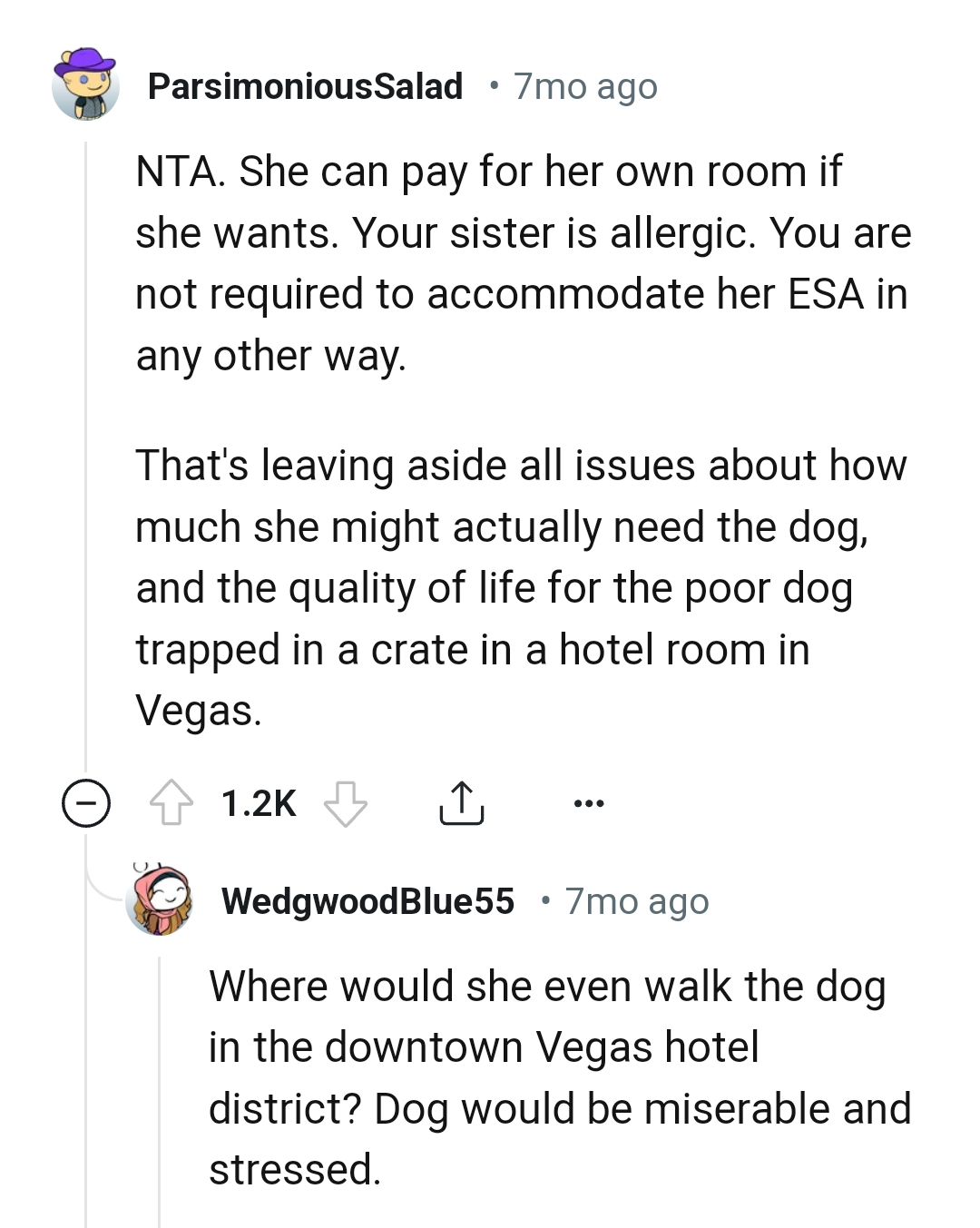
The dog does not need to be there at all
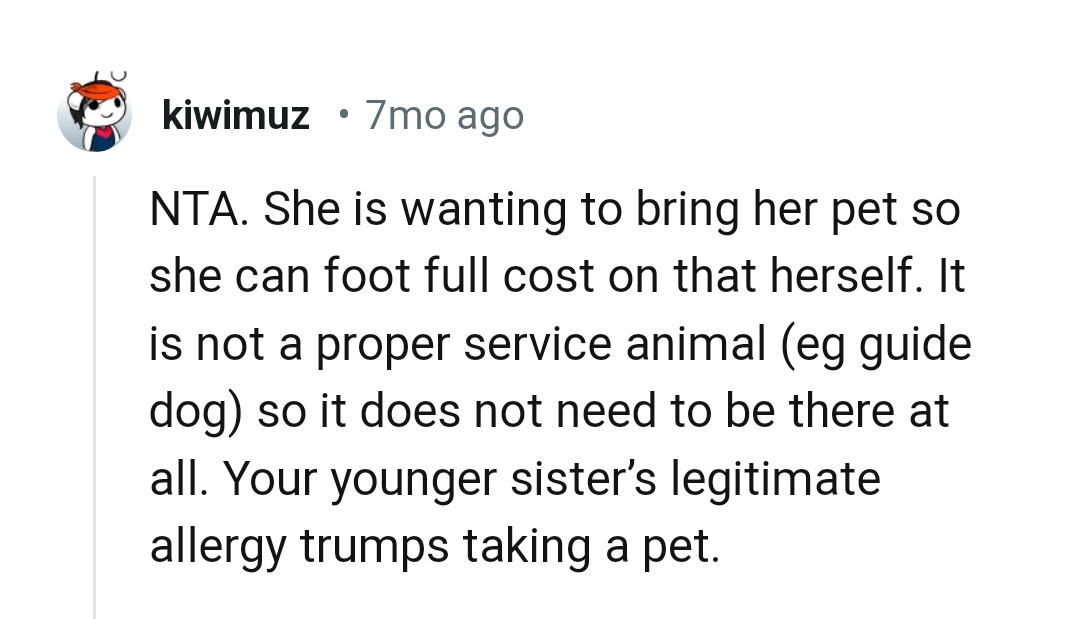
Balancing Needs and Expectations
Experts recommend finding a balance between individual needs and the expectations of the social group.
Open discussions about the role of ESAs can help clarify expectations and reduce misunderstandings.
This proactive approach can foster a more inclusive environment while respecting everyone’s needs.
She sounds like a pretty self-centered individual
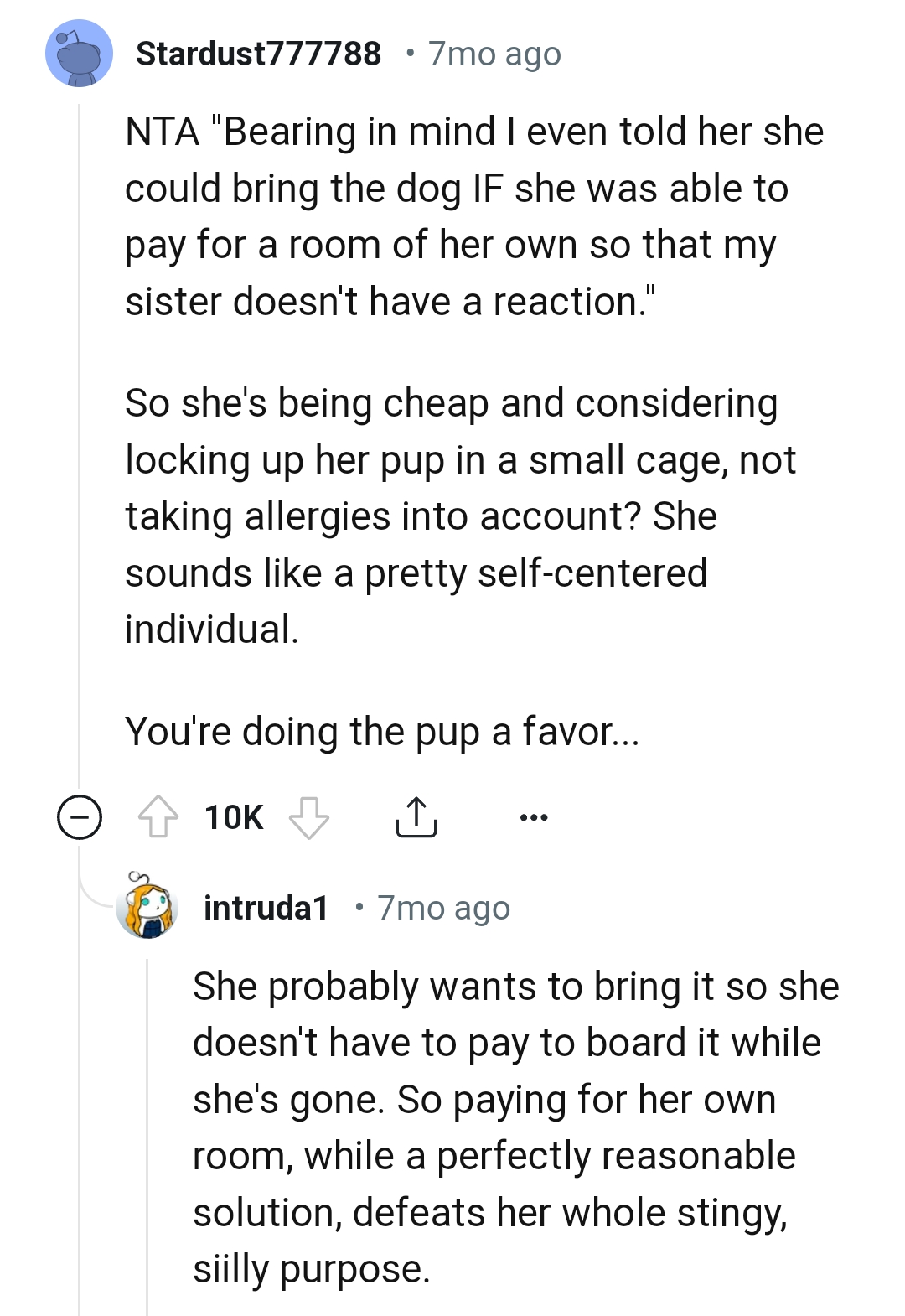
The hotel can't be accepting dogs that large

Research published in the Journal of Social Psychology suggests that open communication about the presence of ESAs can reduce anxiety and foster understanding among group members.
When everyone’s needs are acknowledged, it creates an environment where individuals feel valued and respected.
This can minimize potential conflicts and enhance group cohesion.
She might want to bring the dog to the wedding too

ESAs are not allowed in airplane cabins anymore?
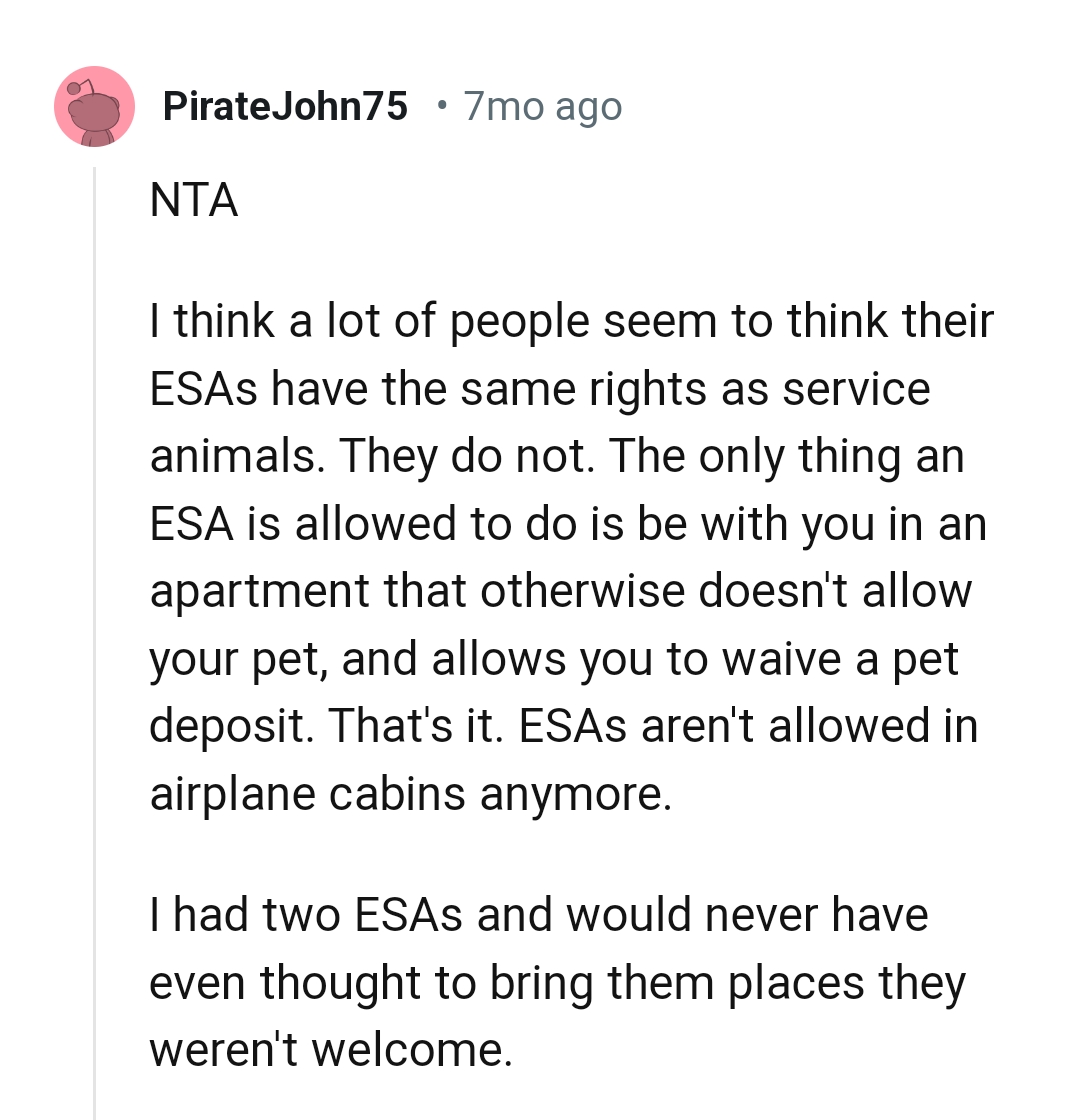
The OP understands that this bridesmaid's dog is her ESA for a reason. The OP also understands that people need accommodations for various things, but this bridesmaid's behavior seems like extreme entitlement to her.
It is not "ableist" to suggest that she should not bring the dog to the worst weekend of her life when the bridesmaid can function just fine without her. The OP was declared not the AH, and that's a wrap.
Expert Recommendations for Navigating ESA Conversations
Dr. Penelope A. Wright, a therapist specializing in anxiety, suggests practicing clear communication when discussing the presence of ESAs.
Using 'I' statements to express how the ESA helps can facilitate understanding and reduce defensiveness.
This approach can help integrate the needs of both the ESA owner and the group, fostering a more harmonious environment.
Psychological Analysis
This scenario highlights the complexities of integrating emotional support animals into social settings, particularly when individual needs clash.
Encouraging open dialogue about these needs can foster a more understanding and supportive environment for everyone.
Analysis generated by AI
Analysis & Alternative Approaches
Emotional support animals can enhance well-being but may also complicate social dynamics.
By fostering open communication and understanding the needs of all parties involved, individuals can navigate these situations more effectively.



